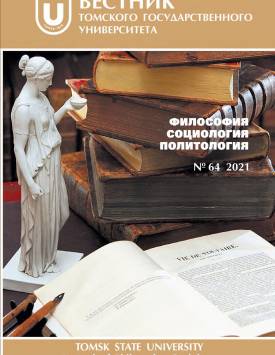Value of the Socio-Institutional Dimension of the Assertion of the Scientific Worldview
For a long time, it has been believed that science deals with “pure” empiricism, which is getting progressively better to cognize, thereby discovering ahistorical truth, the status of which is independent of the cultural and social context. This system of views has been called the positivist paradigm. Its axiomatics extends far beyond the natural science discourse and acts as a general background for an entire era - Modernity. Formed by the scientific mind, ideas about the nature of what exists are reflected in all areas of social life: social goals, value system, social practices, etc. must be scientifically justified. In the second half of the twentieth century, the positivist paradigm was subjected to comprehensive criticism, the result of which was the abandonment of its main imperatives, and the dominant paradigm (today we can say confidently that not only in the field of philosophy of science) has become post-positivist, with its denial of the existence of theoretically nonloaded facts, the cumulative development of scientific knowledge, approximation to the unchanging absolute truth. Due to the fact that science has ceased to be perceived as a universal cognitive methodology, which has allegedly become the result of the natural evolution of mind, the question of the factors that ensured its dominant position in modern society becomes especially acute. The article focuses on the socio-institutional dimension of the assertion of the scientific worldview, in which the organizational forms of science - academies of sciences and universities - that have made scientific ontology a general cultural worldview a priori, are especially prominent. As a result of the analysis, the article summarizes that the victory of modern era science is an ontological revolution that took place on the basis of the consolidation of a new worldview in the minds of Europeans, which was implemented by “sociological” methods (through the formation of social institutions, endowing them with resources and influence, reorientation to their interests of the energy of educational programs and institutions, the formation of the army and the hierarchy of functionaries, etc.). It was this social process, and not practical achievements (which came in the masses a hundred years after the establishment of science as a new cultural dominant), that created a new cultural field, in which science reigned in the place of church, and its verdicts and discoveries were expected as before people expected for mass and miracle.
Keywords
science, ontology, rationality, Academy of Sciences, universityAuthors
| Name | Organization | |
| Levytskyy Viktor S. | Ukrainian Institute of Strategies of Global Development and Adaptation | victor2609@ukr.net |
References

Value of the Socio-Institutional Dimension of the Assertion of the Scientific Worldview | Tomsk State University Journal of Philosophy, Sociology and Political Science. 2021. № 64. DOI: 10.17223/1998863X/64/3
